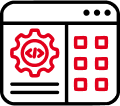
IoT: The New Face of Employee Empowerment
Read more
Discover how containerization can support agile development and reliable operations, modernizing your infrastructure and empowering your teams to deliver faster.
Let's Get Started
Streamline app delivery by making your systems faster, more reliable, and easier to manage. By leveraging tools such as Kubernetes, we empower your business to scale quickly, cut costs, and deliver better digital experiences.





Unlock the full power of cloud-native performance with expert container orchestration. DPL’s experts are here to ensure your applications run reliably, scale automatically, and deploy faster.
Move smarter by aligning your infrastructure with your growth goals via a clear, scalable containerization strategy.
Get tailored containerized environments that deliver the flexibility you need without compromising control, security, or speed.
Ensure your containers are secure, auditable, and enterprise-ready with robust measures that safeguard workloads.
Automate with greater consistency and exponentially speed up your entire software delivery process via CI/CD pipelines.
Transform monolith architectures into modular, independently deployable services for resilient cloud-native applications.
Transform infrastructure management to scale faster and bulletproof provisioning across cloud or hybrid environments.
Containerization is a lightweight virtualization method where applications run in isolated environments called containers. In case you’re wondering, virtualization entails the creation of virtual versions of hardware, systems, or storage. That way, multiple environments can run independently on a single physical machine.
Each container includes the app and its dependencies, ensuring consistency across development, testing, and production. This, in turn, means it’s independent of the underlying infrastructure or operating system.
Container orchestration is the automated management of containerized applications at scale. It handles the deployment, networking, scaling, and availability of containers across clusters of machines. As a result, apps run reliably and efficiently.
Container orchestration tools such as Kubernetes or Docker Swarm are used to manage containers. Basically, they automatically start, stop, restart, and balancing loads across nodes containers to keep your apps running smoothly and at the right scale.
Whereas managing a few containers is simple, the fact is that modern applications often run hundreds across multiple servers. Without orchestration, keeping them running, updated, and balanced is time-consuming and error-prone. Container orchestration automates this complexity using the best container management platform for this job. This ensures high availability, faster deployments, and efficient resource use. As a result, teams can focus on building features rather than managing infrastructure.
No, container orchestration is a subset of application orchestration.
Container orchestration focuses on managing containers, automating their deployment, scaling, networking, and health using tools like Kubernetes or Docker Swarm.
On the other hand, application orchestration entails coordinating multiple components or services of an application (which may include containers) to work together. This could involve APIs, databases, VMs, functions, and containers across different environments.